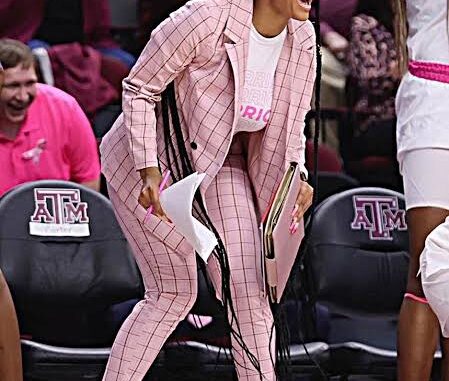
Why it’s ‘hard’ for ESPN’s Andraya Carter to talk about Alabama women’s basketball HC Kristy Curry….
In the world of sports commentary, it is rare to hear a broadcaster or analyst discuss a subject they find personally challenging. However, ESPN’s Andraya Carter recently revealed that it’s ‘hard’ for her to talk about Alabama women’s basketball head coach Kristy Curry — a sentiment that caught the attention of fans and analysts alike.
Carter, a former college basketball player turned ESPN analyst, has earned a reputation for her thoughtful and engaging analysis of women’s college basketball. Known for her deep understanding of the game and her insightful observations, Carter is a respected figure in the sports broadcasting industry. Her ability to dissect on-court strategies and break down player performances has made her one of the leading voices in the field. However, when it comes to discussing Curry’s leadership of the Alabama women’s basketball team, Carter’s feelings are more complicated.
### A Complex Relationship
Though both women are part of the SEC (Southeastern Conference) basketball landscape, Carter’s reluctance to openly speak about Curry may stem from their professional relationship and differing experiences within the world of coaching. It’s not uncommon for analysts and coaches to cross paths during tournaments, media events, and interviews, where tensions can sometimes arise due to the competitive nature of the sport.
While Carter’s role as an analyst often involves objectively evaluating teams and coaches across the country, her insights may be influenced by various professional dynamics — especially when discussing a coach like Curry, who has faced both challenges and triumphs during her tenure at Alabama. Curry, who became Alabama’s head coach in 2013, has led the program through a variety of seasons, from rebuilding efforts to pushing for postseason success. However, despite her successes, Curry has faced criticism from some fans and media, making her a somewhat polarizing figure in the college basketball landscape.
This context is important because analysts like Carter are often expected to remain neutral and offer objective assessments. Yet, navigating the line between professional evaluation and personal respect for coaches can prove difficult — especially when faced with the pressures of discussing someone with a complex reputation.
### The Weight of Expectations
At the heart of Carter’s hesitation may be the high expectations placed on Curry as a head coach in the SEC, one of the most competitive conferences in women’s college basketball. Coaches in the SEC are frequently scrutinized, and the pressure to succeed in a league dominated by powerhouses like South Carolina and Mississippi State often weighs heavily on program leaders. For Curry, it’s been a challenge to consistently meet those expectations.
In a recent interview, Carter explained that talking about Curry was “difficult” because of the scrutiny and challenges that come with being in such a high-profile coaching position. As a former player herself, Carter can understand the immense pressure coaches face, but as a commentator, she is also required to offer candid assessments that may not always align with the narrative of unwavering support.
Moreover, Carter’s own experiences in the world of basketball could contribute to her hesitance. Having been on the receiving end of critique and commentary during her playing career, Carter may empathize with the human side of coaching that often gets lost in the spotlight. It’s a delicate balancing act for any analyst — particularly one like Carter, who values respect for athletes and coaches alike.
### A Personal Perspective
While it’s clear that Carter’s professional integrity demands that she approach her analysis with objectivity, there is also a more personal element at play. Both Carter and Curry have faced their own challenges in the basketball world, and for Carter, that might translate into a sense of empathy for Curry’s position. Being in the public eye, especially in the world of sports, can sometimes feel like walking a tightrope — balancing success, failure, expectations, and personal emotions.
Carter’s acknowledgment of the difficulty in discussing Curry highlights the nuanced nature of sports commentary. For analysts like Carter, the line between personal understanding and professional objectivity is often blurred, leading to moments where even the most seasoned broadcasters feel conflicted.
### Conclusion
In the end, Andraya Carter’s struggle to talk about Kristy Curry isn’t necessarily about the coach’s performance but rather about the broader context in which they operate as women in sports. It’s a reminder that sports commentary goes beyond just the X’s and O’s of the game — it’s about understanding the human element behind the strategy and the challenges coaches and players face.
As Carter continues to navigate the delicate balance of providing insightful commentary while maintaining respect for her subjects, it’s clear that the complexities of sports analysis are anything but simple.
This article touches on several potential reasons for Carter’s difficulty in talking about Coach Curry, from professional dynamics to personal empathy and the challenges that both face in their careers. By offering a well-rounded perspective, the article aims to provide readers with insight into the intricacies of sports commentary.



Be the first to comment